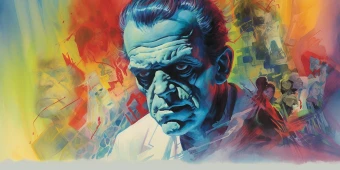by Tim O'Brien


The Things They Carried: Quotes
“They carried the sky. The whole atmosphere, they carried it, the humidity, the monsoons, the stink of fungus and decay, all of it, they carried gravity.” (Chapter 1).
This quote is one of the most significant quotes from “The Things They Carried”. It emphasizes the weight and burden the soldiers carry, both physically and metaphorically. It conveys the oppressive and overwhelming nature of the war, as they bear not only their physical equipment but also the emotional and psychological weight of their experiences. The inclusion of the sky and atmosphere signifies the all-encompassing nature of their burdens.
“They carried the soldier's greatest fear, which was the fear of blushing. Men killed, and died, because they were embarrassed not to.” (Chapter 16)
This quote speaks to the vulnerability and shame experienced by the soldiers. It reflects the intense pressure to maintain a sense of masculinity, courage, and composure in the face of fear and danger. The fear of blushing highlights the soldiers' struggle to maintain a facade of bravery, underscoring the complex and conflicting emotions they face in war.
“A true war story is never moral. It does not instruct, nor encourage virtue, nor suggest models of proper human behavior, nor restrain men from doing the things men have always done. If a story seems moral, do not believe it.” (Chapter 7)
This quote challenges conventional notions of war storytelling and the idea that war narratives should be didactic or teach moral lessons. O'Brien suggests that the truth of war defies simplistic moral frameworks. He highlights the ambiguity and moral complexity of war experiences, emphasizing the difficulty of finding clear-cut moral lessons within the chaotic and unpredictable realm of warfare.
“They carried all they could bear, and then some, including a silent awe for the terrible power of the things they carried.” (Chapter 1)
This quote captures the profound emotional weight and reverence the soldiers attach to the objects they carry. It highlights the significance and symbolic value of the physical items as they become embodiments of the soldiers' fears, memories, and identities. The "terrible power" of the things they carry reflects the immense impact these objects hold on their lives and their connection to the larger context of war.
“A thing may happen and be a total lie; another thing may not happen and be truer than the truth.” (Chapter 7)
The quote suggests that the factual accuracy of an event does not necessarily determine its truthfulness. It highlights the power of storytelling and the subjective nature of truth, as different perspectives and interpretations can shape the understanding of an event. O'Brien challenges the notion that truth is solely based on objective reality, emphasizing that truth can be found in the emotional impact and meaning attributed to an experience, regardless of its factual accuracy.
This idea resonates throughout the novel as O'Brien blurs the line between fact and fiction, often acknowledging the fictionalized aspects of his stories. By doing so, he underscores the importance of emotional truth and the way storytelling can convey deeper truths that may go beyond what is strictly factual.
“But the thing about remembering is that you don't forget.” (Chapter 3)
The quote highlights the paradoxical nature of remembering. While one may try to suppress or repress memories, they persist and resurface, often unexpectedly. O'Brien suggests that memories, particularly those associated with traumatic experiences like war, have a lasting hold on individuals, defying efforts to completely forget or erase them. This speaks to the power and persistence of memory in shaping one's identity and emotional landscape.
In the context of the novel, the quote reflects the enduring impact of war on the soldiers. The memories of their experiences continue to shape their lives even after they return from the battlefield. O'Brien explores how these memories shape their perceptions, relationships, and understanding of the world around them. The soldiers carry the weight of their memories, which become an integral part of their being.
“I survived, but it's not a happy ending.” (Chapter 4)
The quote challenges the conventional notion of a "happy ending" associated with survival. While survival is often regarded as a positive outcome, the quote implies that it is not necessarily accompanied by happiness or a sense of resolution. It highlights the lingering emotional and psychological scars that result from war experiences, even for those who physically survive.
By stating that survival is not a happy ending, the quote suggests that the cost of war goes beyond physical casualties. It acknowledges the profound emotional and psychological toll that war exacts on the soldiers. The traumas they endure, the loss they witness, and the moral dilemmas they face leave lasting effects that cannot be easily overcome or forgotten.
“I was a coward. I went to the war.” (Chapter 4)
The quote "I was a coward. I went to the war" from "The Things They Carried" reflects the conflicting emotions and internal struggles faced by the soldiers who served in the Vietnam War. It encapsulates the complex nature of courage, fear, and personal accountability in the context of war.
The first part of the quote, "I was a coward," reveals the self-perception of the speaker, suggesting a sense of guilt or shame associated with their actions or lack thereof. It highlights the internal conflict and self-doubt experienced by individuals who question their own bravery in the face of the war's challenges. This admission of cowardice challenges traditional notions of heroism and valor associated with war narratives.
The second part of the quote, "I went to the war," adds another layer to the speaker's self-reflection. It acknowledges their participation in the war despite their feelings of cowardice. This juxtaposition raises questions about the motivations, societal pressures, and personal decisions that led them to enlist or be involved in the conflict. It highlights the complexity of human choices and the varied reasons people find themselves in the midst of war, often defying simplistic notions of bravery or cowardice.

- Instructions Followed To The Letter
- Deadlines Met At Every Stage
- Unique And Plagiarism Free


 Othello
Othello
 The Yellow Wallpaper
The Yellow Wallpaper
 Frankenstein
Frankenstein